- Home
- Hammond Innes
Solomons Seal Page 20
Solomons Seal Read online
Page 20
‘No. He didn’t seem to understand what was going on. He was worried about the safety of his people. He’s a redskin, you see …’
‘What’s that supposed to mean?’
‘Anybody from Papua New Guinea. They’re lighter-skinned, and it seems there’s been trouble between them and the Bougainvilleans.’ We reached the main road, and I turned right, towards the town. ‘Was it really a hold-up? What happened?’
I told her briefly, and by the time I had finished we were at the first house. I parked right against the entrance, jumped out and beat on the door. A woman answered it. ‘May I use your phone, please?’
She looked at me, startled, a small pale face under a fringe of dark hair. ‘Why? Has there been an accident?’
‘Excuse me.’ I pushed past her. ‘Where is it?’
‘The phone?’ She seemed slightly dazed. A record player was blaring in the background. ‘It’s over there, by the kitchen. But you can’t use it. Not now.’
‘Why not?’
‘Something’s gone wrong with it. Sandra – that’s my daughter – she was trying to ring a friend. Then I tried, but it’s out of order, I guess. I’m sorry. Can I help at all? If it’s an accident … ’
‘I’ll try the next house,’ I said, and left her standing there with her mouth agape.
It was a man who answered the door this time. He worked in Community Relations and knew the number of the police. But when he tried to get it for me, he found the phone was dead. ‘Looks like there’s a fault in the line for this part of the town. If it’s urgent, you’d find it quicker to drive there.’ He started to give me directions, but now that I was faced with people in their houses, living their normal lives, I was beginning to realise how difficult it was going to be to convince anyone of what I had seen.
‘I’ll go direct to the hospital,’ I said.
‘It’s an accident, is it?’
‘Something like that.’
‘Anything I can do? If you’ve run down one of the indigenes—’
‘No. It’s something else.’
He stood in the doorway, watching me as I drove off, a puzzled, uncertain look on his face. ‘We’ll go to the hospital,’ I told Perenna. ‘We can get Perry to ring the police from there.’
‘You didn’t get them then?’
‘No. His phone was out, too.’
She was silent for a moment; then she said quietly, ‘Do you think we’ll find all the phones are out?’
The same thought was in my mind, but it was something I didn’t want to think about. ‘We’ll know when we get to the hospital.’ I was wishing now I had told the man what had happened. In Community Relations he might have known if there was any trouble brewing. I glanced at Perenna, sitting tight-lipped beside me. ‘Did your brother give you any hint about what those guns might be used for?’
‘No.’ And she added quickly, ‘He’s not involved. It’s Teopas.’
I didn’t say anything, knowing that Teopas was a man who obeyed orders. He would never have planned a raid on the Provincial Government offices. I should have brought that Community Relations man with me. Phil Brewster. That was the name he had given me. The hospital showed up ahead, and I turned into the entrance.
At the reception desk I asked for Perry. ‘He’s with a patient of yours, Eddie Flint.’
The woman picked up the house phone, spoke to somebody and then said Mr Perry would be right down. I asked her to get me the police then, but she said, ‘I’m sorry. The outside lines are out of order.’
‘Since when?’
‘About quarter of an hour.’ She glanced up at the wall clock. ‘We haven’t been able to contact anybody since before six.’
We waited in silence until Perry appeared. ‘You’ve been a hell of a time.’ He was smiling, relieved that we had finally turned up. ‘What happened? Did you lose your way?’
‘Let’s get out to the car,’ I said. ‘I’ll tell you what happened as we drive to the police station.’ And I hustled him out, Perenna talking quickly all the time, telling him about the two houses we had stopped at to telephone. ‘All the phones are out, even the hospital.’
‘That’s a matter for the telephone engineers, not the police.’
‘Don’t talk, just listen.’ I pushed him into the passenger seat. I don’t know why. It was instinctive, not reasoned. I just didn’t want him to drive; his reactions were too slow. He protested, of course, but by then I was behind the wheel and had the engine going. ‘Just tell me where to go.’ And as I followed his instructions, I gave him a brief account of what I had seen at the Government offices.
He didn’t believe me, of course. ‘An armed band?’
And then Perenna in the back seat was telling him what the Chimbu man had said.
‘You don’t want to believe anything they tell you,’ he said. ‘They’re plain stupid. Rock apes, that’s what we call them.’
I heard the angry intake of her breath. ‘I’d have you know, Mr Perry, that I was brought up with the Chimbu people—’
‘There’s police headquarters now,’ he interrupted her, pointing to a white building away to our left. ‘Do you really expect them to believe that there’s some sort of a plot—’
‘They’ll soon find out when they get over to the Government offices.’ Perenna’s voice was controlled now, but very tense.
I was swinging left into the parking area, and then I slammed on the brakes. Standing by the front entrance was a closed truck. ‘A Dodge, isn’t it?’ I was remembering the trucks I had seen on Hans Holland’s RPL.’
‘What is it?’ Perry asked. ‘Why have you stopped?’ His voice was pitched a shade higher, suddenly nervous.
‘I think that truck belongs to the Buka Trading Co-operative.’
‘Then they must be delivering something. There’s no reason to believe—’ His voice cut off abruptly in a gasp. A group of policemen were coming out of the building, their hands above their heads. Two men armed with machine-pistols followed. I switched off our lights, leaving the engine running, and we watched as the policemen were herded into the back of the truck at gunpoint. Then everything suddenly went dark.
I glanced back over my shoulder. Not a light showed anywhere in Arawa. The township was in total darkness. I heard Perry mutter, ‘Christ! They’ve got the power station.’
With the engine just ticking over, and in low gear without lights, I turned the car and felt my way back on to the road. Government headquarters, the telephone exchange, the police and now the power station. The thing that had been in the back of my mind, that I had feared all the time, had happened. It was a coup, a carefully planned coup. ‘Now we know what those guns were for.’ I turned to glance back at Perenna. ‘Did your brother know?’
‘Of course he didn’t.’ But there was no conviction in her voice.
I didn’t say anything, remembering that first night when I had found him drinking alone in the wardroom. He may not have known, but he’d had a pretty good idea. No wonder he had been scared.
‘What do we do now?’ She was leaning forward so that I felt the urgency of her breath on my ear.
‘Get a message out.’ I switched the lights on full and started driving. It was a loosely sprung car, the road-holding poor, but it had a big engine, and out on the main road I got her moving. I glanced at Perry sitting hunched in his seat, his face pale and frightened. ‘Where’s the transmitter – up at the mine?’ He nodded. ‘And they have emergency generators?’
‘Yes.’ Suddenly he grabbed hold of my arm. ‘Do you think – those men – do you think they’re up at the mine already?’
‘That’s something we won’t know till we get there,’ I said as we crossed the bridge over the Bovo River. The town was behind us now, the trees closing in. The road still steamed, but the rain had stopped, and there were fewer toads. ‘Shouldn’t there be some traffic on this road?’ We hadn’t met a single vehicle.
He nodded. ‘It’s usually quite busy at this time of the day. Men going hom
e—’ He hesitated. ‘Perhaps we should go down to Anewa and check at the power station. There may have been a breakdown.’
‘Does that happen often?’ I asked.
‘No.’
‘Well, then—’ The speedometer was reading eighty. At any moment we would reach the intersection where the mine road came in from the left. I eased my foot on the accelerator. Suppose they had a road block there? Or had they sealed the mine road higher up?
‘How many work up at the mine?’ Perenna asked.
‘I don’t know,’ he said. ‘It varies. But several thousand.’
‘What about whites? At any rate, men with cars. How many would normally be coming down at this time of day?’
She never got the answer to that, for suddenly, clear in the headlights was a figure in a white shirt and carrying a furled umbrella standing in the middle of the road. He stood facing us, signalling us to stop and pull in to the side. A rope was stretched across the roadway between two oil drums, and in the middle was a large noticeboard. ‘Have you got a torch in the car?’ I asked. The man appeared to be unarmed.
Perry reached into the glove locker and handed me a powerful plastic torch. I stopped with my bonnet close against the rope barrier. The board had the words BRIDGE BLOCKED – PLEASE PROCEED ANEWA FOR INSTRUCTIONS painted on it with an aerosol spray. The man came up to my side, leaning down to peer in at the window. ‘You go to Anewa, plis.’ His face was broad and very black, his hair standing up like a golliwog’s.
‘That’s where I’m going,’ I said.
White teeth showed in a big smile. ‘Gutpela. Anewa okay.’ And he went to the oil drum on the left, undid the rope and pulled it clear. The glow of a vehicle showed through the trees coming from the direction of Anewa. I switched off my lights and called him back to my window. ‘That notice,’ I said. ‘The bridge isn’t blocked. We’ve just come over it.’
Uncertainty showed on his face. ‘I’ll remember you,’ I said, shining the torch full in his eyes. And then, while he was still blinded, I slammed the gear lever home, pushed my foot hard down and, with the engine roaring, shot away from him, the tyres slithering on the wet surface as I took the sharp turn on to the mine road. I did it without lights, only switching them on when I was out of range of any pistol he might have been carrying. ‘How far to the mine?’
‘Ten miles, I’d say,’ Perry said.
‘And the surface?’
‘You don’t have to worry about that. Tarmac all the way.’
The road stretched ahead of me, straight and smooth, the gradient only slight, so that I was again doing eighty in top gear. ‘When do we start climbing?’
‘Some miles yet. Then it gets rapidly steeper as the road claws its way up the side of the mountain. You need to be careful then. There are a number of hairpin bends and a nasty drop on the left.’
Perenna leaned close to me. ‘That man. Did you recognise him?’
‘No. I find these black faces confusing. He was from Buka, wasn’t he? That very black glossy skin and hair. Why? Is he one of your brother’s crew?’
‘Not Jona’s. But I think I saw him helping to shift those cases on to the RPL.’ And then she tapped me on the shoulder. ‘There are headlights now, down the road behind us.’
I glanced in the mirror. They were just coming into sight round a shallow bend, presumably the vehicle coming from the direction of Anewa that had allowed me to make it on to the mine road without lights. ‘Is it gaining on us?’
She was twisted round in the back seat, watching it. ‘I don’t think so,’ she said at length. ‘In fact, it looks more like a truck. The headlights are too high off the ground for it to be a car.’
Either they had made certain of the Administration and the port before moving on to the mine or else we were going to find ourselves trapped. The jungle of green growth bordering the road did not look at all inviting as a way of escape, and higher up there would be scrub and rock and precipitous slopes. The gradient was already getting steeper, a breeze blowing off the tops and the road drying. Stars were beginning to show, so that ahead, beyond the gleam of the headlights, I was getting glimpses of the crest of the range etched as a jagged line against the night sky. We crossed a bridge over a rock gulley. Nothing visible to the left, just the blackness of a sheer drop.
‘Can you still see that vehicle?’ I asked Perenna.
‘Just a glimpse now and then. And I think there are two of them, but they’re a long way away now.’
The first real bend was coming up, the tarmac running into gravel on the broad verge as the road swung round to the right. ‘Must be a good view from here.’
‘Wait till you get to the big hairpin just short of the pass,’ Perry said. ‘You can see the whole coastline from there, all the lights.’ He waited till we were round the bend. ‘I was forgetting the power had been cut off.’
Steep, blast-hewn slopes of red earth and rock rose above us, lightly clothed by regeneration. ‘When we get to the top, how far to the mine?’
‘Not far. A mile, perhaps a little more.’
‘And the offices, where are they?’
‘They’re the first thing you come to, on a sort of plateau overlooking Paguna.’
‘Will the mine manager be there, do you think?’
He shook his head. ‘I couldn’t say.’ We were into a double bend now, and when we were round it and snaking out over a black drop, he added, ‘Normally he’d have left by now. Like the rest of us, he lives in Arawa. But with the power off, he’s probably still there. A power failure means the crushers, the concentrator, all the vital machinery comes to a standstill. That’s a major crisis as far as he’s concerned, so he’ll be around somewhere.’
As I went into a long curving right-hand bend, I was thinking that if I were managing one of the biggest mines in the world, and the power and telephone systems failed, I certainly wouldn’t be sitting in my office. I would be out making sure something was being done about it. The slopes to the right of us were so sheer they had been terraced. We were running out to the long buttress of an outcrop, another black void opening up below us, the outline of the tops very close, and as we approached the next backward loop, I slowed the car, stealing a quick glance to the left. Far below in the dark void I could see the road up which we had climbed, a tiny thread of tarmac lit by headlights. Two vehicles, a long way behind now.
‘They’re moving very slowly,’ Perenna said. ‘And they’ve closed up. They’re almost head-to-tail.’
I drove on round the loop. Old trucks, full of armed men – it would take them at least ten, perhaps fifteen minutes to grind their way up to where we were now. I slipped into bottom gear, my foot hard down as the road rose steeply to skirt an outcrop that faced to the right. We were almost at the top. Round the outcrop, we were into a defile, and suddenly we were on the level, our speed increasing as I went up through the gears, and Perenna’s voice behind me saying, ‘Strange, we haven’t met a single car.’
‘Not strange at all,’ Perry answered her. ‘A power failure causes a lot of problems. They’ll all be staying up here trying to cope.’ And then to me: ‘It’s downhill for about a mile, and then there’s a cut-off to the left. The offices are there.’
Lights glimmered in a great bowl in the mountains. Driving fast now, I couldn’t see any details, but I got the impression of a scarred and terraced crater, a sort of moonscape. The road dropped quickly, a glimpse of trees, and suddenly the cut-off was there, the shallow slope of roofs beyond. ‘Left now,’ Perry shouted, and I slammed on the brakes, tyres slithering as I made the turn, and then we were up on a plateau, and I had stopped at steps leading to the veranda of a long, low single-storey building.
‘This it?’ Perry nodded, his door already open.
We rushed in, the three of us, to be faced by a young woman looking cool and neat. But when Perry asked for the mine manager, she informed him that he had flown to Melbourne two days ago. ‘Then we’d like to see Mr Tooley.’
‘I’m afr
aid he’s busy right now.’
‘Is he in his office or not?’ I asked her.
‘No, I’m afraid—’
‘Just tell us where he is then. It’s urgent.’
‘I’m not sure. I know he was going down to the concentrator first. There’s a power failure, you see, and the telephone—’
‘Who’s in charge here?’
‘Well, nobody really. I think I’m the only one here now. They’re all down at the mine.’
The mine area, when we got down into it, was huge. It was an open-cast mine, a stupendous gravel pit of an area with huge drag cranes shovelling ore into the Euclids and Haulpaks that lumbered like mammoths over the dirt road. We spent an exasperating ten minutes wandering round the massive complex of the concentrator with its electrolytic tanks, driving from one dusty building to another, before we finally ran him to earth at the pit workshop.
He was a tall, rangy Canadian, and he didn’t take it in at first, his mind on other things. ‘Are you trying to tell me there’s been some kind of an uprising?’ That was after I had described what we had seen at police headquarters. Then he turned to Perry. ‘You’re one of the power station engineers. Why the hell didn’t you go down to Anewa and see what the situation was for yourself?’
Even with the power off and the telephone out, I don’t think he would have accepted our version of what had happened if I hadn’t told him about the arms we had trans-shipped off Shortland Island. That finally convinced him. ‘Christ!’ he muttered as he got into the car with us. ‘Bloody politics! We try to keep out of politics, but it’s there all the time, waiting to trip us up.’ By the primary crushing plant I had to pull in to let one of the Haulpaks past. ‘After all we’ve done for them, the work we’ve put into this place. Turn left here.’ We were on to the exit road then, climbing in zigzags up towards the Administration block. ‘Do you think they’ll be there now?’
I glanced at my watch. Twenty minutes since we had stopped at the offices. ‘Bound to be.’
‘What do you plan to do?’ Perenna asked him.
‘Talk to them, I suppose. Find out what they want. What the hell else can I do?’ And he added, ‘If it had been trouble with those Highland labourers of ours, I could understand. The Administration has had trouble with them before.’

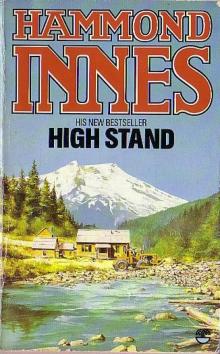 High Stand
High Stand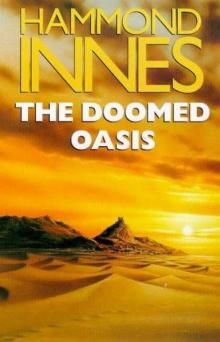 The Doomed Oasis
The Doomed Oasis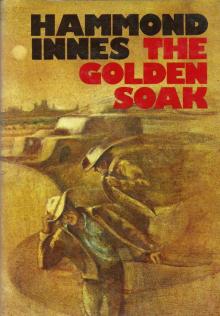 Golden Soak
Golden Soak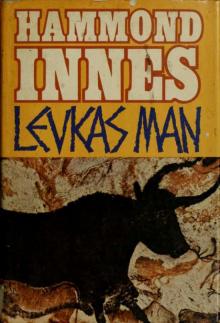 Levkas Man (Mystery)
Levkas Man (Mystery)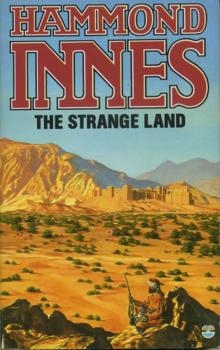 The Strange Land
The Strange Land Dead and Alive
Dead and Alive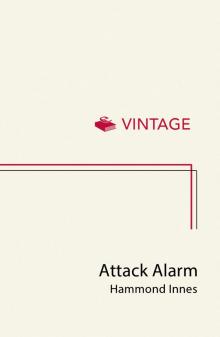 Attack Alarm
Attack Alarm The Strode Venturer
The Strode Venturer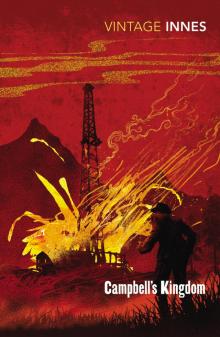 Campbell's Kingdom
Campbell's Kingdom North Star
North Star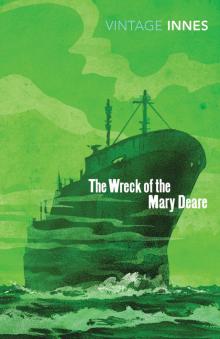 The Wreck of the Mary Deare
The Wreck of the Mary Deare The Lonely Skier
The Lonely Skier The Black Tide
The Black Tide The Trojan Horse
The Trojan Horse Medusa
Medusa Air Bridge
Air Bridge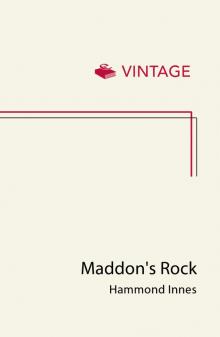 Maddon's Rock
Maddon's Rock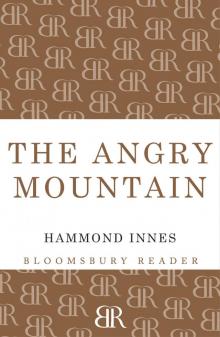 The Angry Mountain
The Angry Mountain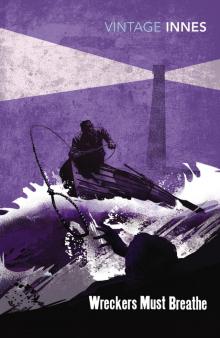 Wreckers Must Breathe
Wreckers Must Breathe Solomons Seal
Solomons Seal The White South
The White South